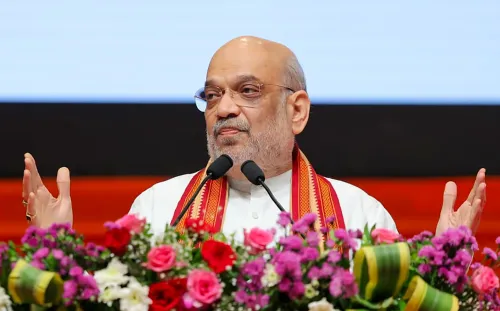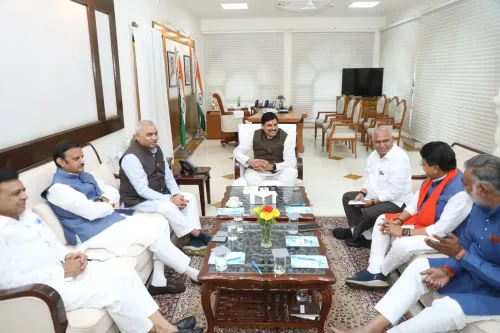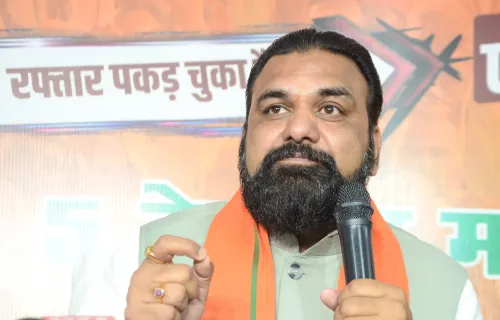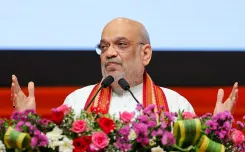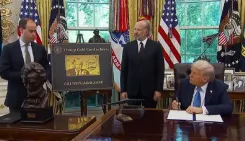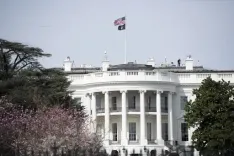What Sparked the Nationwide Strike by Trade Unions?
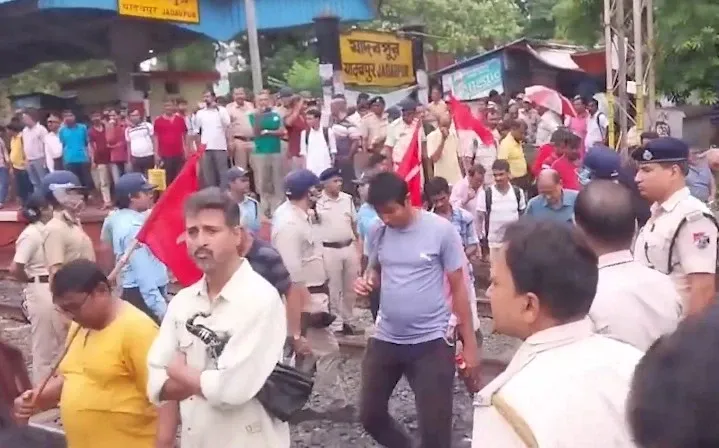
Synopsis
Key Takeaways
- Nationwide strike initiated by multiple trade unions.
- Protests against new labour codes perceived as detrimental to workers.
- Significant disruptions in various sectors, including banking and transport.
- Supported by both worker and farmer organizations.
- Calls for greater employment opportunities and the reversal of privatization policies.
New Delhi, July 9 (NationPress) A nationwide strike is taking place on Wednesday, initiated by ten trade unions to protest against the Centre's purportedly anti-worker, anti-farmer, and pro-corporate labour policies.
This general strike, referred to as 'Bharat Bandh', was organized by a coalition of central trade unions and has garnered support from farmer organizations and rural worker collectives.
Among the unions participating are the All India Trade Union Congress (AITUC), Indian National Trade Union Congress (INTUC), Centre of Indian Trade Unions (CITU), Hind Mazdoor Sabha (HMS), Self-Employed Women's Association (SEWA), Labour Progressive Federation (LPF), and United Trade Union Congress (UTUC), along with farmers' groups such as Samyukta Kisan Morcha and various rural and public sector worker unions, including those from the Railways, NMDC Ltd, and steel industries.
The primary focus of the protests is the opposition to the four new labour codes recently enacted by Parliament. Trade unions contend that these codes undermine workers' rights by limiting the right to strike, extending working hours, and diminishing employer accountability in instances of labour law violations.
Demonstrators have also condemned the ongoing privatization of public sector enterprises, increased outsourcing, and the rise of contract-based employment, which they argue threaten job security and fair wages.
Due to the strike, a range of services including banking, insurance, postal delivery, coal mining, industrial production, state-run public transport, and operations in various regions have been significantly disrupted. Farmer-led rallies have also been reported in numerous rural areas.
However, private sector businesses, educational institutions, and train services remain largely functional.
In Bihar, opposition parties protesting against the Special Intensive Revision (SIR) of voter rolls also criticized the Centre's anti-labour policies.
Road blockades and burning tyres were reported near Danapur Court in Patna, as protesters expressed concerns over alleged manipulation of voter list revisions that they believe would exclude marginalized communities. Opposition leaders have accused the Centre of orchestrating these changes through the Election Commission.
"We did not plan to initiate a Bihar Bandh, but we are witnessing the BJP-led Central government and its leaders, through the Election Commission, engaging in conspiracy," stated CPI(ML) MLA Amarjeet Kushwaha in an interview with IANS.
RJD leader Premchand alias Bholu Yadav remarked, "The entire Bihar will observe a complete shutdown today in protest against the Election Commission, which is accused of acting as an agent for specific interests. Railways, roads, and bus stands are disrupted, causing inconvenience for the public."
In Arrah, MP Sudama Prasad led a highway blockade, while former MLA Arun Yadav organized a protest march from the local railway station, urging shopkeepers to participate in the shutdown.
In Odisha, the strike included protesters blocking train operations in Berhampur and conducting citywide picketing.
Bank, insurance, and postal employees participated under an 11-point charter of demands.
West Bengal witnessed significant demonstrations in support of the bandh across multiple districts, including Howrah, where protesters halted trains at Jadavpur Railway Station and marched along the platform, vocally opposing the central government's labour policies.
Puducherry experienced a complete shutdown with public transport suspended, markets closed, and educational institutions shut down. The strike was spearheaded by trade unions and the INDIA bloc, presenting a 21-point demand charter that includes the reversal of new labour laws and increased employment opportunities for youth.
In Punjab, contract workers from Punjab Roadways, PUNBUS, and PRTC initiated a three-day strike from July 9 to 11.
Protesters staged a dharna outside the Pathankot depot, demanding immediate resolution of their grievances.
This is not the first occurrence of such extensive action. Previous nationwide strikes in 2020, 2022, and 2024 saw millions of workers participating, advocating for more labour-friendly policies and the repeal of contentious economic reforms.

